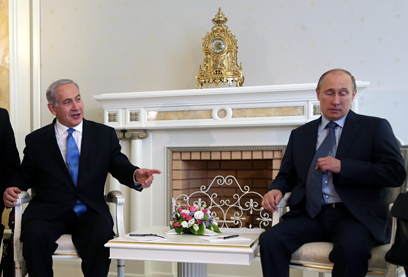 Sunday Times
reports Netanyahu explained to Putin that if S-300 anti-aircraft
missiles reached anti-Israel rebel groups, planes taking off from Ben
Gurion Airport or landing there would be at risk. Israeli officials
dismiss report
Sunday Times
reports Netanyahu explained to Putin that if S-300 anti-aircraft
missiles reached anti-Israel rebel groups, planes taking off from Ben
Gurion Airport or landing there would be at risk. Israeli officials
dismiss report A senior Russian official told The Sunday Times that Russia will not fulfill a deal to sell advanced S-300 anti-aircraft missiles to Syria for fear they could fall into the wrong hands and be used to attack civilian aircraft at Israel's main airport.
In return, he told the British newspaper, the Russians expected Israel to refrain from further airstrikes on Syria.
Israeli government officials dismissed the report. "This story is detached from reality. A fairytale. There was no agreement or understanding achieved between Putin and Netanyahu. That's another piece of fantasizing," one of the officials told Ynet.
"It's likely there would be a great deal of foot-dragging by the Russians, who would use it as a bargaining chip without following through with the deal. Only time will tell," he said.
The Russian official told The Sunday Times, “We are very much concerned about this; the large Russian community in Israel is a major factor in our attitude to Israel, and we will not let this happen."
According to the report, the deal was apparently struck at a "tense" meeting this month between Prime Minister Benjamin Netanyahu and President Vladimir Putin in the Black Sea resort of Sochi.
Netanyahu, with his national security adviser, Ya’akov Amidror, is said to have explained that if the missiles fell into the hands of rebel groups opposed to Israel, planes taking off or landing from Ben Gurion Airport would be within their 125-mile range, The Sunday Times reported.
The Sunday Times said that after the alleged Israeli raid on targets near Damascus earlier this month, the Russians were furious, and Sergey Lavrov, the foreign minister, said the contract would go ahead.
The Russians are now said to be convinced that Israel plans no further attacks, according to the report.

Netanyahu (L) and Putin during meeting in Sochi (Photo: EPA)
“It will take months to manufacture the missiles and to assemble them into an integrated operating system,” Ruslan Aliev, a Russian weapons researcher, told the newspaper.
In addition, Syrian troops would have to fly to Russia to train on the missiles because it would be impractical to send experts into the Syrian conflict zone, he said.
According to the report, there are also doubts whether Syria, battered by more than two years of conflict, still has the means to pay.
Russia had previously cancelled the shipment of high-altitude Mig-31E interceptor jets to Syria and the supply of the Iskander-E tactical ballistic missiles.
The Russian official told The Sunday Times his country’s primary aim was to keep Syria as a single entity. Damascus has agreed in principle to attend an international peace conference scheduled to be held in Geneva next month.
“The Syrians are willing to arrive without preconditions, but so far the rebels are insisting that President Bashar Assad must step down as a precondition. This is unacceptable, and we’re waiting for the US to solve this problem with the rebels,” said the official.
The official said that Russia had no plans to provide refuge for Assad in Moscow. “We are telling the West: if Assad agrees to go we’ll accept it, of course. But we’re not going to suggest this to him. We’ll not give him asylum in Russia, as he will be wanted for sure for a trial at the Hague.”
The official further told The Sunday Times that although Assad had made some progress against the rebels in recent months, it would be “an illusion to think that Assad will be able to put down the uprising.”
Syria signed a contract to buy four S-300 systems in 2010. The deal is worth a reported $800 million. At the request of Israel, Russia postponed delivery of the first batch last year.
No comments:
Post a Comment